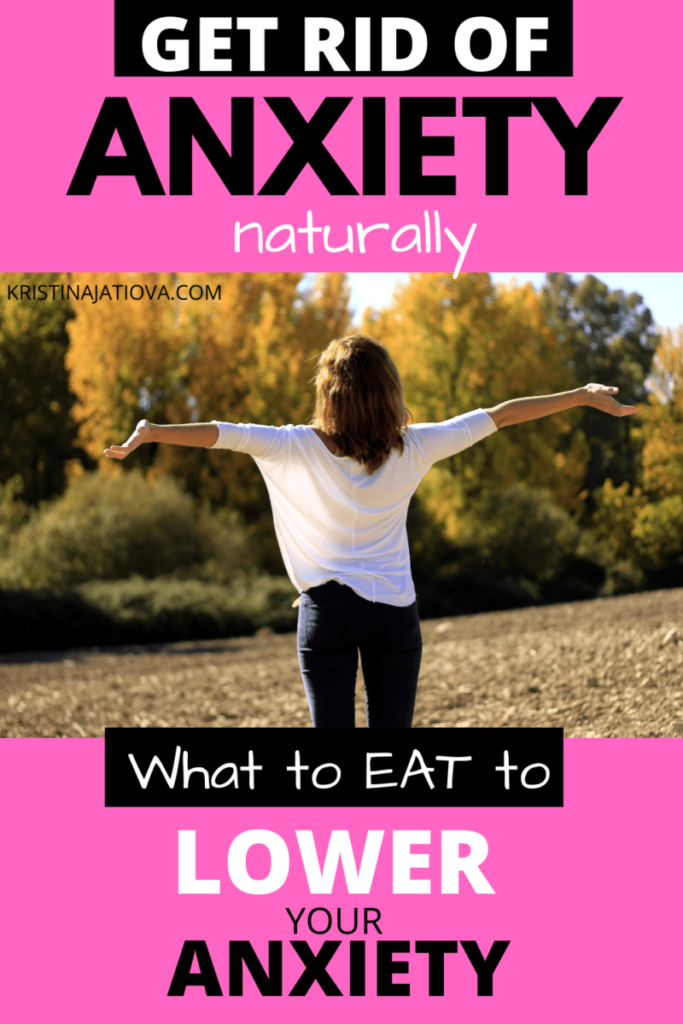Nutrition & Mental Health – Say goodbye to anxiety the natural way!
Mental well-being is a core component of optimal health and it’s a status that individuals can manage stress from daily living and make positive achievements pursuing public interest and contribution to the community.
These days, mental health stands at the very forefront of our daily lives. Many are experiencing ongoing anxiety that can often lead to depression. During these challenging times, it can be truly hard to find the strength to learn & grow.
Symptoms Of Anxiety:
- spaciness
- crying
- dizziness
- confusion
- clenched/nervous stomach
- sweats
- hot/cold flashes
- headaches
- shallow breathing
- chest pain
- tingling arms and legs
- racing heart
- restless leg syndrome
- ears ringing
- unable to catch your breath
- shakey
- sleep problems
The Importance Of Primary & Secondary Foods
Now, more than ever, it is vitally important to prioritize the ‘primary foods’:
- RELATIONSHIPS – surround yourself with people who care; join a group that has similar values to yours, people who ‘get you’, support you and lift you up when you feel down…
- MOVEMENT – whether you agree or not, we were born to move. Whether it is power yoga, pilates, gentle stretching, run, hike, swim or walk, move your body daily. Decide deliberately to do activity for at least 30 minutes every single day. Whatever your natural movement is, just get out there.
- SPIRITUALITY – establish a spiritual practice – whether it’s 5 minutes of deep breathing, ten minutes of meditation, or simply just sitting still – every little helps.
DON’T BELIEVE EVERYTHING YOU THINK. THOUGHTS ARE JUST THAT – THOUGHTS.
~ Allan Lokos
The ‘secondary foods’ are what we put on our plate. The food we eat, the drinks we drink.
I am a massive ambassador of the holistic approach to one’s wellbeing. But as much as I highly value and agree with the irreplaceable importance of the ‘primary foods’, the so-called ‘secondary foods’ – nutrition, is vitally as important. If you don’t drink water, and don’t support your body with the right foods, then chances are, you might very easily slip into a depressed state of mind (sooner than later), and you surely won’t move out of the bed/sofa bursting with health & happiness!
Studies show that nutrition has been implicated in behaviour, mood and in the pathology and treatment of mental illness.

Nutrition and Mental Health
I am aware, that for many, what we feed our body with (daily nutrition), doesn’t make it between the top priorities. I, however, can’t stress enough how important it is to feed not only your mind but also your body with the right food. After all, 80% of serotonin (the feel-good hormone) is made in the gut, and the gut and brain are connected with the longest nerve in the body – vagus nerve (think about it as a highway). The gut is responsible for creating neurotransmitters that alter your mood. Meaning the food we eat has a direct impact on how you feel – it can trigger anxiety or increase the chance of having a panic attack.
It is truly important to pay attention to the health of our microbiome (gut). The majority of neurological diseases originate in the gut.
It was Hippocrates – the Ancient Greek physician who lived nearly 2500 years ago who said:
Every disease begins in the gut.
Every time we drink or eat or expose ourselves to chemicals or other environmental hormones (xenoestrogens), we are either feeding the disease or fighting it!
The central neurosystem only produces 15 – 20% of the number of neurotransmitters that the body needs in order to operate on a daily basis. That said. the rest of our neurotransmitters are produced in the gut! So to address any imbalances in the body, we have to look at the health of our gut first.
Dysbiosis and inflammation of the gut have been linked to causing several mental illnesses including anxiety and depression, which are prevalent in society today.
Heal your gut, and the rest of the body will follow.
RELATED POST: 9 Everyday Habits To Heal Your Gut Naturally
A diet based on whole foods, including fish, vegetables and fruits has an anti-inflammatory impact, therefore can be a protective factor for depression and anxiety. Probiotics has been also proven to have an anti-inflammatory and anti-oxidative effect, and they help to introduce the good bacteria in the gut. Many are benefiting by including foods high in probiotics to their diet daily (especially after countless years of taking antibiotics!). Many of us are also unknowingly exposed to antibiotics in our food chain, which wipes out the good gut bacteria.
Eating balanced meals on a regular basis and consuming nutrients that support mental health including omega-3, antioxidants (hello fruits and veggies), and B-vitamins are suggested.
What To Eat To Improve Mental Health & Lower Depression and Anxiety
These are my top 7 nutrients I suggest you include regularly in your diet, so you can experience a positive effect on your mental health (lower your anxiety and depression).
1. Omega 3 Fatty Acids – 99% of the population is deficient in Omega 3 fatty acids
Some main food sources: seaweed (nori, wakame), algae (spirulina, chlorella, E3-Live), chia seeds, hemp seeds, flax seeds, walnuts, and oily fish such as salmon, mackerel, sardines.
Seaweed and algae are important sources of Omega 3 for those on a vegetarian and vegan diet, as they are one of the few plant groups that contain DHA and EPA.
When it comes to fish – please, do your best to know the source of the fish (where does it come from). It is rather very unfortunate, however, a high amount of fish contain significant levels of mercury, and you certainly don’t want that in your one & precious body.
2. Vitamin D –
Sunshine is the cheapest and the best option, but when it comes to foods, some of the best sources are eggs, cheese, mushrooms and fatty fish like salmon, mackerel, sardines, herring, cod liver oil.
3. B Vitamins – specifically B9 (folate) and B12 helps with the mood
Some main foods sources are dark and leafy vegetables (broccoli, spinach), almonds, sunflower seeds, avocados, bananas, sweet potatoes, lentils, beans, chickpeas, cheese, brown rice, fish, chicken and beef (beef liver is a powerhouse of B12), wholegrains, and fortified nutritional yeast.
Turmeric root – studies show that turmeric’s (Curcuma) effectiveness was similar to standard anti-depressant medication (like Prozac). The high-absorption curcumin works against depression by promoting neurogenesis, increasing serotonin, norepinephrine, and dopamine levels—and inhibiting inflammation.
4. Magnesium –
Some main food sources: almonds, avocado, banana, raspberries, nuts, seeds, chickpeas, black beans, soybeans, edamame, peas, brown rice, asparagus, salmon, mackerel, dark leafy greens.
Magnesium is involved in over 400 biochemical reactions in the human body, and it is the body’s 4th most abundant mineral. Despite that, over 80% of the population is magnesium deficient.
5. Probiotics –
Some main food sources are kefir, kimchi, sauerkraut, greek unsweetened yoghurt and other fermented foods.
The recent research suggesting a link between the gut microbiome and depression. Eating prebiotics like onions, garlic, leeks, Jerusalem Artichokes, chicory root, dandelion greens, asparagus, apples, bananas, together with the probiotics can support a healthy balance of the gut bacteria.
RELATED POST: Easy and Utterly Delicious Vegan Kimchi Recipe
6. Antioxidants – vitamin A, C and E –
Antioxidants are found in a ubiquitous amount in colourful raw plant foods.
Some main food sources are broccoli, cauliflower, bell peppers, cabbage, tomatoes, grapes, berries, sweet potato, sunflower seeds, almonds, avocados, spinach, butternut squash and carrots.
7. Zinc –
Zinc deficiency has been found in many people who suffered from mental illness.
Some main food sources are legumes (lentils, chickpeas, beans), seeds (hemp seeds, squash seeds, pumpkin seeds, sesame seeds), nuts (cashews, pine-nuts, almonds, peanuts – technically a legume), hard cheese, eggs, seafood and meat. The richest source of zinc are oysters.
Legumes contain phytates. These antinutrients inhibit the absorption of zinc and other minerals, meaning zinc from legumes isn’t as well absorbed as the zinc from animal products. Sprouting, heating, soaking or fermenting plant sources of zinc like legumes can increase this mineral’s bioavailability. Just like grandma always did – back to the roots!.
What To Avoid To Lower Anxiety & Depression
There are a variety of different dietary approaches that offer their points on what is the right diet to support your mental health. All of them agree, that certain foods should be avoided.
Lowering the intake of the following might benefit those who are looking to lower anxiety and depression, and improve mental health overall.
- Histamine
- Sugar
- Dairy
- Gluten
- Caffeine
Histamine
Lowering the intake of foods that contain histamine might have a big impact. Some of the foods high in histamine are cured meats and aged cheeses, wine and fermented foods like kimchi, kefir, sauerkraut, yoghurt, pickles and vinegar.
Here is a fantastic article about histamine intolerance.
Sugar
When you eat large amounts of carbs at once it can spike your glucose, which doubles the adrenaline levels. This has been shown to cause erratic behaviour in children and anxiety in adults. Sugar also feeds the bad gut bacteria and Candida. Candida releases mycotoxins when it reproduces, and that creates histamine. Sugar has truly detrimental effects on your health and anxiety might be one of them.
Dairy
Dairy is an inflammatory food. When your gut is inflamed, the brain is inflamed too. Any inflammation in the body triggers the immune system and the nervous system to kick into high gear. If you are dealing with anxiety, it’s the best to reduce the intake until you know you are affected by it.
Gluten
Gluten makes your anxiety worse. This is because gluten causes inflammation in the body, stimulating the nervous system and increases the histamine reaction. Gluten also increases the risk of developing leaky guy – allowing for autoimmune disorders and gut infections. Reducing consumption of gluten could do wonders in fighting the anxiety.
Caffeine
Caffeine consumption (coffee, black tea) increases blood pressure, doubles the stress hormone cortisol and norepinephrine levels. Cutting back on caffeine can reduce stress on the nervous system.

The use of essential oils and aromatherapy, as well as drinking calming herbal teas can be very helpful when feeling anxious.
Essential oils to calm the anxiety naturally:
- Levander
- Lemon
- Ylang Ylang
- Clary Sage
- Valerian
- Patchouli
- Geranium
- Sandalwood
- Frankincense
Essential oils can be used through diffusing, incorporating into baths or lotion, topical application with a carrier oil or inhaling the scent directly. You can also drop a few drops directly onto your pillow.
I get my high-quality essential oils from Wild As The Wind and truly no one day goes by without using some. You can check them out here.
Best Herbal Teas For Anxiety:
- St. John’s worth
- Tulsi Tea
- Chamomile
- Valerian Root
- Lemon Balm
- Levander
- Passion Flower
Conclusion:
The foods you’re feeding your body with is only one part of the puzzle. We have to look at the whole picture and treat the body & mind from a holistic perspective – as a whole. Your thoughts and daily habits are equally important in addressing mind imbalances.
Practices such as daily gratitude or a prayer, deep breathing, regular movement, as well as finding the time to connect with family, friends and loved ones on a deeper level are vitally important.
We also have to take into consideration that feelings/emotions are just that – feelings (feeling depressed, anxious…). And emotions are harmless. When you acknowledge that feelings/emotions are triggered by your thoughts, it is important to know that you can change what you are thinking.
You read that right – you can change your thoughts. An amazing practice (and habit to develop) is to write down on the paper all of your thoughts every morning after you wake up (or you can practice this in the evening).
Empty your head. Write anything that is on your mind. This way you can observe your thoughts written down, and seeing them for what they are. Just thoughts. You can decide to think different thoughts on the purpose.
Breathe. You’re going to be okay.
Breathe and remember that you’ve been in this place before.
You have been this uncomfortable and anxious and scared, and you’ve survived.
Breathe and know that you can survive this too. These feelings can’t break you.
They’re painful and debilitating, but you can sit with them and eventually, they will pass.
Maybe not immediately, but sometime soon, they are going to fade and when they do, you’ll look back at this moment and laugh for having doubted your resilience.
I know it feels unbearable right now, but keep breathing, again and again.
This will pass. I promise it will pass.
~ Daniel Koepke
YOU MAY ALSO LIKE: 5 Self-improvement Ideas That Will Change Your Life
Take a deep breath and know, that everything is going to be ok at the end. You have the power within you to make your life remarkable.
And if it’s not ok, then it’s not the end.
Have you tried any of above to lower your anxiety? What else have you found that works for you? Let me know in comments below.
Keep Shining!

YOU MAY ALSO LIKE:
13 Simple Ways To Start Eating Healthy Today
7 Tips How To Make Your Brain Healthy
10 Small Lifestyle Changes For Healthier & Happier Life
50 Highly Positive Morning Quotes To Uplift, Encourage and Empower
REFERENCES:
https://www.ncbi.nlm.nih.gov/pubmed/28707609
https://www.ncbi.nlm.nih.gov/pmc/articles/PMC4967717/
https://www.ncbi.nlm.nih.gov/pmc/articles/PMC5641835/
https://pubmed.ncbi.nlm.nih.gov/12498628/
https://pubmed.ncbi.nlm.nih.gov/25369924/
https://www.bustle.com/p/can-vitamins-help-mental-health-these-7-supplements-may-have-mood-boosting-properties-8591288
https://www.medicalnewstoday.com/articles/323144#vegetarian-and-vegan-sources-of-omega-3

0 Comments